The Wholesome Journey - Group Nutrition Coaching Program
Mentorship Program, 1:1 Nutrition Coaching with Alison
What do you want to learn more about?
Program Login
Podcast Features
October 27, 2017
Alison Tierney, MS, RD, CD, CSO
Alison is a registered dietitian, board-certified in oncology nutrition, and a cancer thriver. Her expertise in oncology nutrition and personal experience with her own cancer diagnosis and its treatment provide her with the unique perspective of being able to relate to her clients on an entirely different level. Her content is consistently focused on evidence-based guidelines and seeks to increase the awareness of the power of nutrition to complement traditional cancer therapies.
- Alison Tierney, MS, RD, CD, CSO
- Alison Tierney, MS, RD, CD, CSO
- Alison Tierney, MS, RD, CD, CSO
- Alison Tierney, MS, RD, CD, CSO
- Alison Tierney, MS, RD, CD, CSO
- Alison Tierney, MS, RD, CD, CSO
- Alison Tierney, MS, RD, CD, CSO
- Alison Tierney, MS, RD, CD, CSO
- Alison Tierney, MS, RD, CD, CSO
- Alison Tierney, MS, RD, CD, CSO
- Alison Tierney, MS, RD, CD, CSO
- Alison Tierney, MS, RD, CD, CSO
- Alison Tierney, MS, RD, CD, CSO
- Alison Tierney, MS, RD, CD, CSO
- Alison Tierney, MS, RD, CD, CSO
- Alison Tierney, MS, RD, CD, CSO
- Alison Tierney, MS, RD, CD, CSO
- Alison Tierney, MS, RD, CD, CSO
- Alison Tierney, MS, RD, CD, CSO
- Alison Tierney, MS, RD, CD, CSO
- Alison Tierney, MS, RD, CD, CSO
- Alison Tierney, MS, RD, CD, CSO
- Alison Tierney, MS, RD, CD, CSO
- Alison Tierney, MS, RD, CD, CSO
- Alison Tierney, MS, RD, CD, CSO
- Alison Tierney, MS, RD, CD, CSO
- Alison Tierney, MS, RD, CD, CSO
- Alison Tierney, MS, RD, CD, CSO
- Alison Tierney, MS, RD, CD, CSO
- Alison Tierney, MS, RD, CD, CSO
- Alison Tierney, MS, RD, CD, CSO
- Alison Tierney, MS, RD, CD, CSO
- Alison Tierney, MS, RD, CD, CSO
- Alison Tierney, MS, RD, CD, CSO
- Alison Tierney, MS, RD, CD, CSO
- Alison Tierney, MS, RD, CD, CSO
- Alison Tierney, MS, RD, CD, CSO
- Alison Tierney, MS, RD, CD, CSO
- Alison Tierney, MS, RD, CD, CSO
- Alison Tierney, MS, RD, CD, CSO
- Alison Tierney, MS, RD, CD, CSO
- Alison Tierney, MS, RD, CD, CSO
- Alison Tierney, MS, RD, CD, CSO
- Alison Tierney, MS, RD, CD, CSO
- Alison Tierney, MS, RD, CD, CSO
- Alison Tierney, MS, RD, CD, CSO
- Alison Tierney, MS, RD, CD, CSO
- Alison Tierney, MS, RD, CD, CSO
- Alison Tierney, MS, RD, CD, CSO
- Alison Tierney, MS, RD, CD, CSO
- Alison Tierney, MS, RD, CD, CSO
- Alison Tierney, MS, RD, CD, CSO
- Alison Tierney, MS, RD, CD, CSO
- Alison Tierney, MS, RD, CD, CSO
- Alison Tierney, MS, RD, CD, CSO
- Alison Tierney, MS, RD, CD, CSO
- Alison Tierney, MS, RD, CD, CSO
- Alison Tierney, MS, RD, CD, CSO
- Alison Tierney, MS, RD, CD, CSO
- Alison Tierney, MS, RD, CD, CSO
- Alison Tierney, MS, RD, CD, CSO
- Alison Tierney, MS, RD, CD, CSO
- Alison Tierney, MS, RD, CD, CSO
- Alison Tierney, MS, RD, CD, CSO
- Alison Tierney, MS, RD, CD, CSO
- Alison Tierney, MS, RD, CD, CSO
- Alison Tierney, MS, RD, CD, CSO
- Alison Tierney, MS, RD, CD, CSO
- Alison Tierney, MS, RD, CD, CSO
- Alison Tierney, MS, RD, CD, CSO
- Alison Tierney, MS, RD, CD, CSO
- Alison Tierney, MS, RD, CD, CSO
- Alison Tierney, MS, RD, CD, CSO
- Alison Tierney, MS, RD, CD, CSO
- Alison Tierney, MS, RD, CD, CSO
- Alison Tierney, MS, RD, CD, CSO
- Alison Tierney, MS, RD, CD, CSO
- Alison Tierney, MS, RD, CD, CSO
- Alison Tierney, MS, RD, CD, CSO
- Alison Tierney, MS, RD, CD, CSO
- Alison Tierney, MS, RD, CD, CSO
- Alison Tierney, MS, RD, CD, CSO
- Alison Tierney, MS, RD, CD, CSO
- Alison Tierney, MS, RD, CD, CSO
- Alison Tierney, MS, RD, CD, CSO
- Alison Tierney, MS, RD, CD, CSO
- Alison Tierney, MS, RD, CD, CSO
- Alison Tierney, MS, RD, CD, CSO
- Alison Tierney, MS, RD, CD, CSO
- Alison Tierney, MS, RD, CD, CSO
- Alison Tierney, MS, RD, CD, CSO
- Alison Tierney, MS, RD, CD, CSO
- Alison Tierney, MS, RD, CD, CSO
- Alison Tierney, MS, RD, CD, CSO
- Alison Tierney, MS, RD, CD, CSO
- Alison Tierney, MS, RD, CD, CSO
- Alison Tierney, MS, RD, CD, CSO
- Alison Tierney, MS, RD, CD, CSO
- Alison Tierney, MS, RD, CD, CSO
- Alison Tierney, MS, RD, CD, CSO
- Alison Tierney, MS, RD, CD, CSO
- Alison Tierney, MS, RD, CD, CSO
- Alison Tierney, MS, RD, CD, CSO
- Alison Tierney, MS, RD, CD, CSO
- Alison Tierney, MS, RD, CD, CSO
- Alison Tierney, MS, RD, CD, CSO
- Alison Tierney, MS, RD, CD, CSO
- Alison Tierney, MS, RD, CD, CSO
- Alison Tierney, MS, RD, CD, CSO
- Alison Tierney, MS, RD, CD, CSO
- Alison Tierney, MS, RD, CD, CSO
- Alison Tierney, MS, RD, CD, CSO
- Alison Tierney, MS, RD, CD, CSO
- Alison Tierney, MS, RD, CD, CSO
- Alison Tierney, MS, RD, CD, CSO
- Alison Tierney, MS, RD, CD, CSO
- Alison Tierney, MS, RD, CD, CSO
- Alison Tierney, MS, RD, CD, CSO
- Alison Tierney, MS, RD, CD, CSO
- Alison Tierney, MS, RD, CD, CSO
- Alison Tierney, MS, RD, CD, CSO
- Alison Tierney, MS, RD, CD, CSO
- Alison Tierney, MS, RD, CD, CSO
Things I love about fall:
Cooler weather
Cozy blankets [especially on Saturday mornings]
Warm almond milk lattes
Snuggling into a warm bed [hello mattress pad heater!]
Wait…if you live in colder weather climates and haven’t tried a mattress pad heater, you are missing out. My husband, who originates from ‘way up-der’, thought it was a dumb idea. Well, I grew up with one and really wanted one when we were married. Well, well, well. Look who loves getting into a heated bed in the fall, winter, and even spring! That’s right. I digress…
Scarves
Beautiful colors
Football Sundays
& of course, warm comforting soups
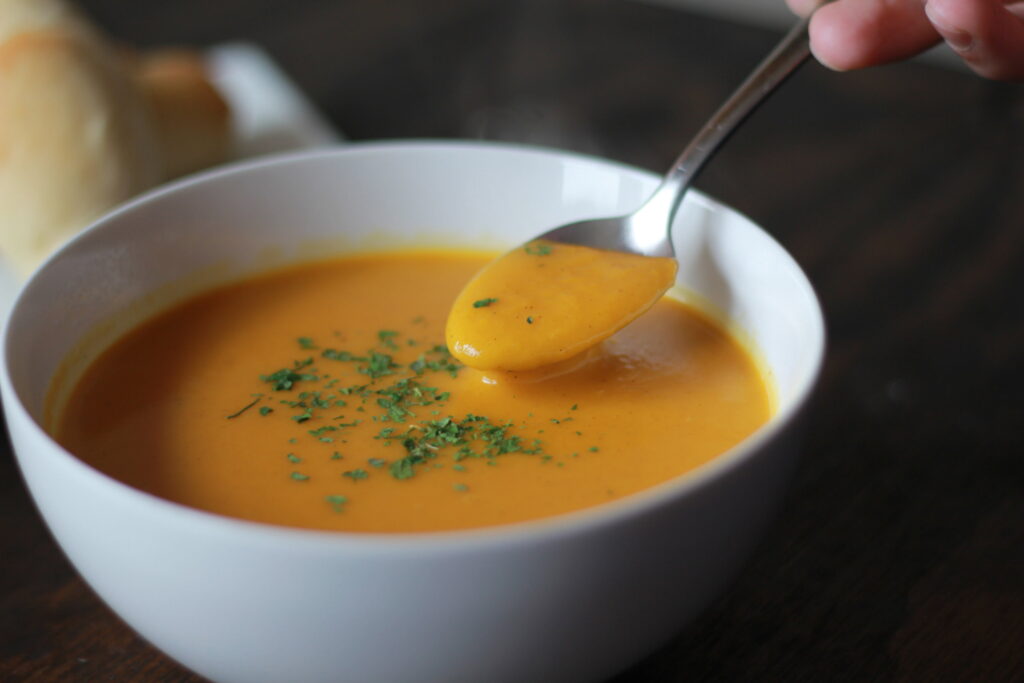
This soup is one of our favorites come this time of year. We first started making this soup a couple of years ago. I actually didn’t even know if I liked butternut squash when I first had it. Who knew I actually really liked it–especially in the form of soup! I think many of us walk right past the wide variety of winter squashes at the grocery store due to their irregular shapes and textures. I am entirely guilty as well. I admit I still need to venture into this area a little more and not just focus on our most well-known and widely used squash–canned pumpkin. [yum, pumpkin bread!]
Winter squash, such as butternut, acorn, banana, turban, etc. are excellent sources of vitamin A, carotenoids and potassium. Carotenoids are a phytochemical, or plant-nutrient, known for its disease fighting characteristics as it helps with immune function, protecting our eyes and maintaining healthy cells. The American Institute for Cancer Research (AICR) reports diet high in carotenoids are “probably” at lower risk for mouth, pharynx, larynx, and lung cancers. (1)
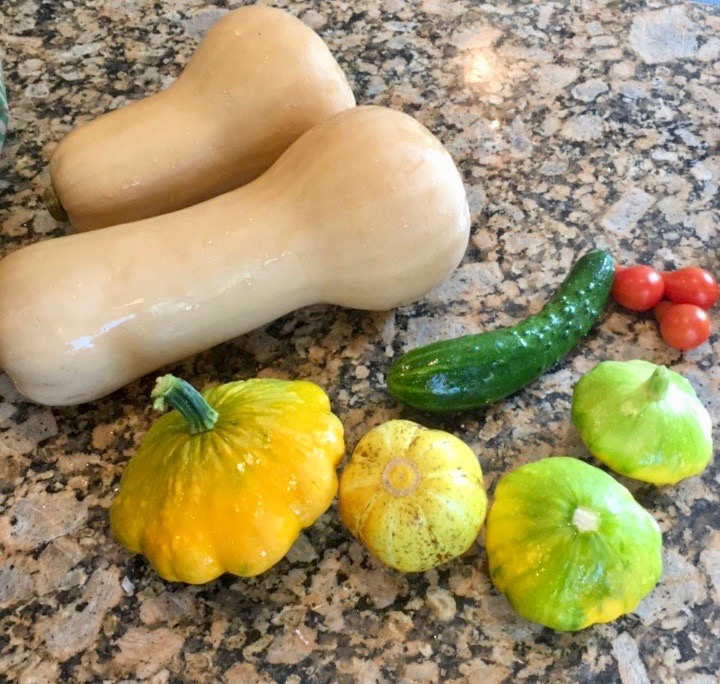
I could go on and on about the health benefits of butternut squash, other types of squash and even the other ingredients in this soup. But I’ll save you from my nutrition ramble. One fact I do want to note is winter squashes last about 2-3 months when stored at room temperature or slightly cooler (1). Even though the squash could last this long, I don’t want you to wait to make this soup. You’ll be missing out.
Plus, we harvested our butternut squash for this soup from our own garden and I don’t want it to take up space on my counter any longer.
Here’s to breaking the rules with this warm, comforting soup curled up under the blankets on the couch and watching Sunday football. Thank you, Fall. <3
What is your favorite fall dish/food?
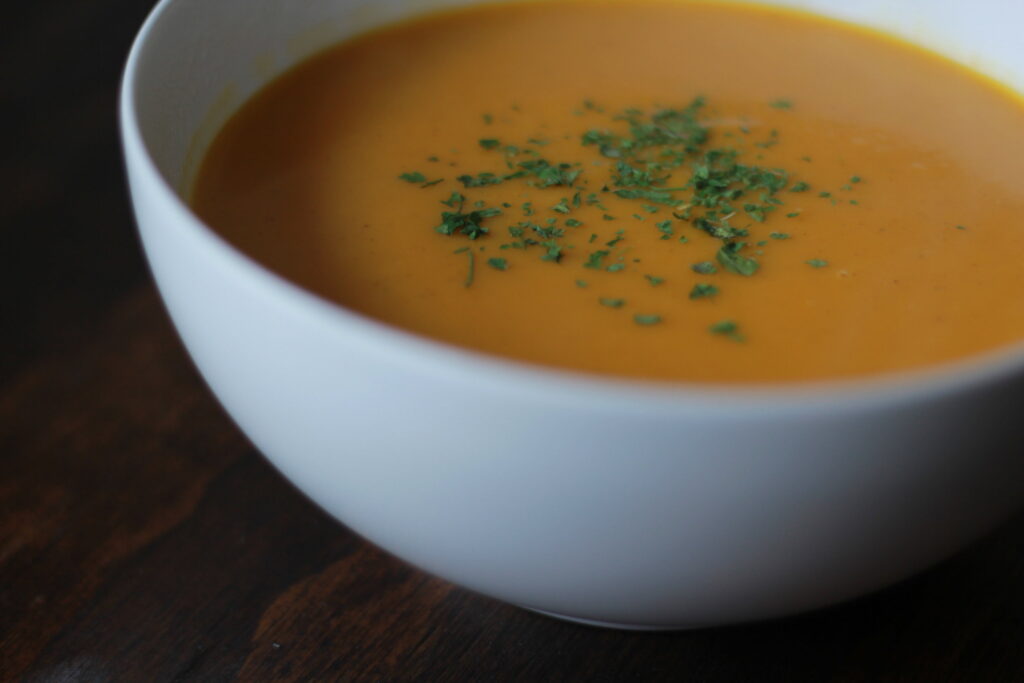
Gingered Butternut Squash Soup
Serves: 6-8
ingredients
1 large onion, chopped
1 stalk celery, chopped
3 cloves garlic, chopped
2″ piece ginger root, peeled & grated
1 1/2 teaspoons curry powder
1 teaspoon pumpkin pie spice
3 cups diced & roasted butternut squash*
1 small apple, diced & with peel
4 cups low-sodium vegetable broth
1 cup milk, almond milk, or light coconut milk
Salt, pepper, and hot sauce, to taste
for garnish, if desired
Roasted cashews, chopped
Fresh parsley, chopped
directions
Heat a large soup pot over medium-low heat. Once hot, add the onion, celery, and garlic. Add the dry spices and ginger. If the vegetables begin to stick, add 1 tablespoon of water or vegetable broth at a time, as needed. Cook the vegetables for about 5 minutes, until softened.
Add the broth, apple and roasted squash. Simmer for about 15 minutes, until apple is soft. Reduce heat to low.
Puree with a food processor or immersion blender. Add your preferred milk until heated (be sure the soup does not come to a boil if using cow’s milk). Season to taste. Add desired garnish.
*To Roast Squash: You can choose to buy pre-diced squash. If using full squash, rinse under water briefly. Prick the squash with a fork and microwave for about 5 minutes. When cool enough, cut the squash horizontally in half. Using a spoon, remove the seeds and strings. Place on a foil lined cookie sheet, lie open faced, lightly season with salt & pepper, brush with 1 tablespoon of oil and roast 25-30 minutes at 400 degrees. When the squash is soft, allow it to cool and scoop out the flesh with a spoon.
(1) AICR’s Foods That Fight Cancer™. (n.d.). Retrieved October 26, 2017, from http://www.aicr.org/foods-that-fight-cancer/squash.html
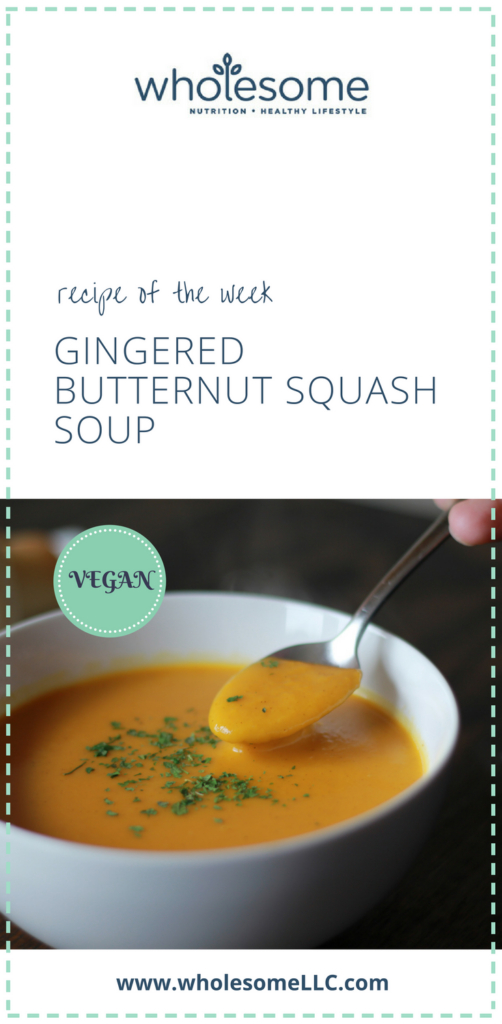
Gingered Butternut Squash Soup
Leave a Reply Cancel reply
Featured Articles
Wholesome LLC is not a medical practice, and its employees cannot offer medical advice. This website provides educational information but it is not a substitute for medical advice from a licensed medical professional who is familiar with your particular facts and circumstances. The information contained on this website is not intended to diagnose, treat, or cure any disease and shall not be construed as medical advice. The information and education on this website is provided for you to use at your own discretion.
You can further review our disclaimer here.
Wholesome
About Alison
Courses & Programs
The Wholesome Journey
Free Resources
FAQs
Press & Media
Recipes
Blog
Contact Us
Shop
© 2026 Wholesome, LLC All rights reserved.
Privacy Policy
Terms of Use
Disclaimer
Mobile Terms of Service
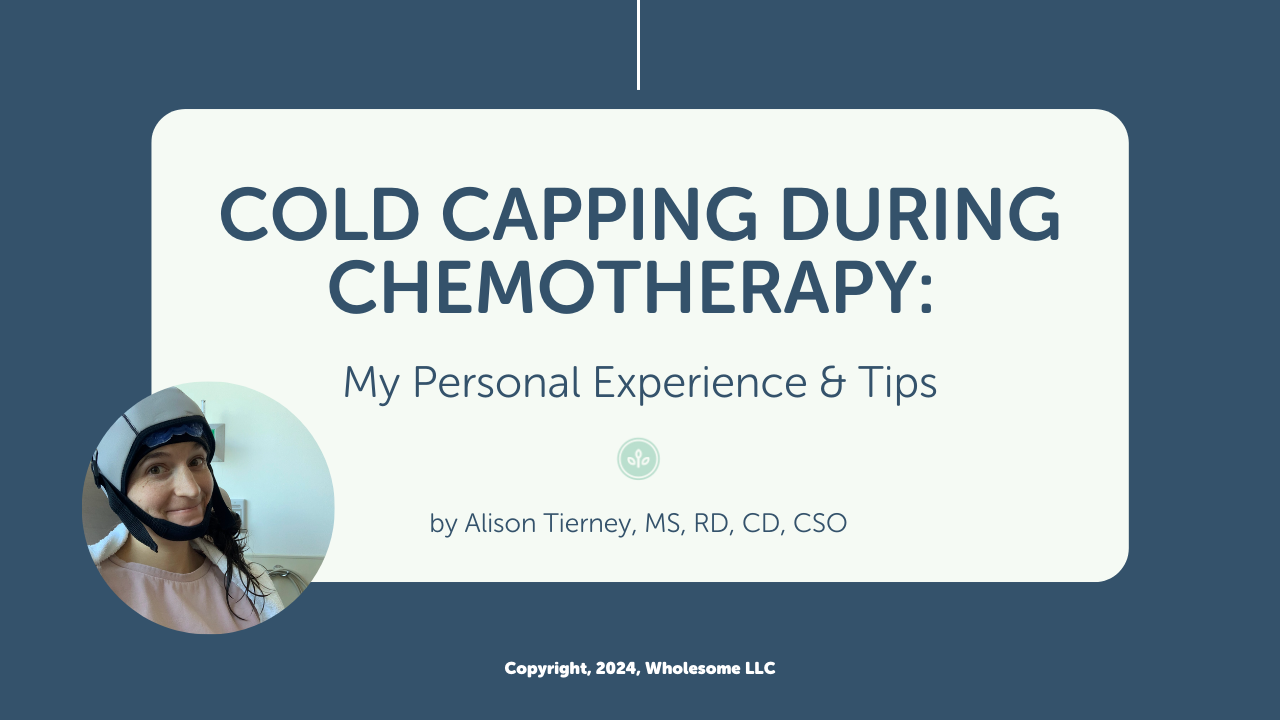

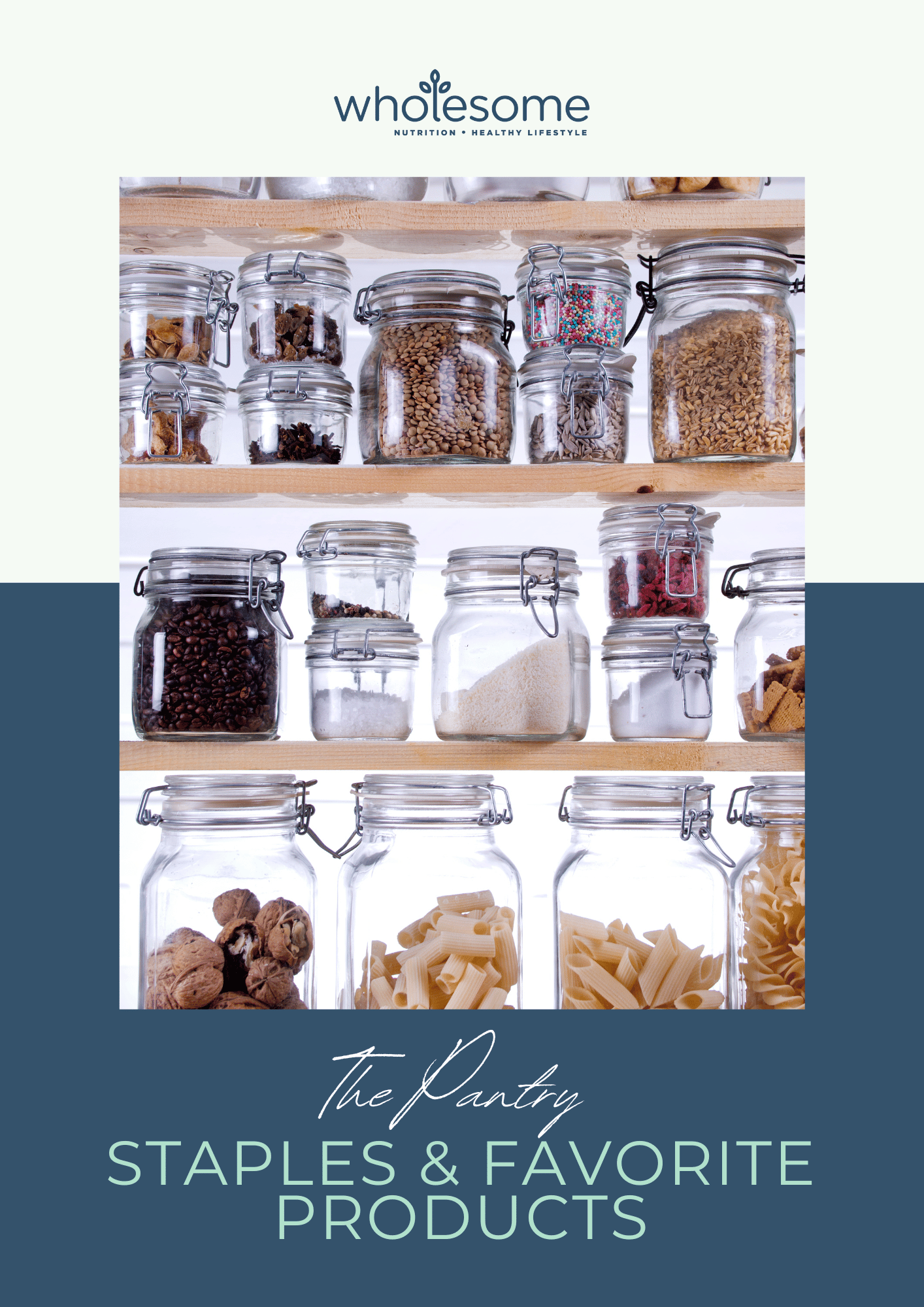
Be the first to comment